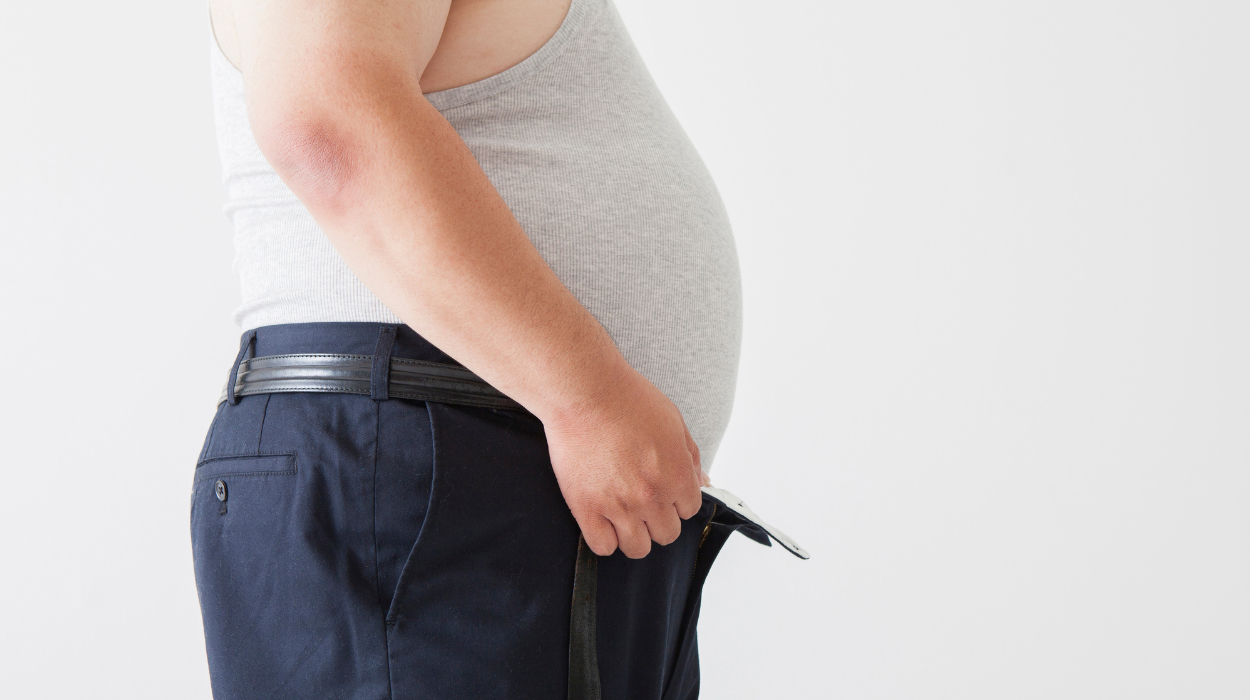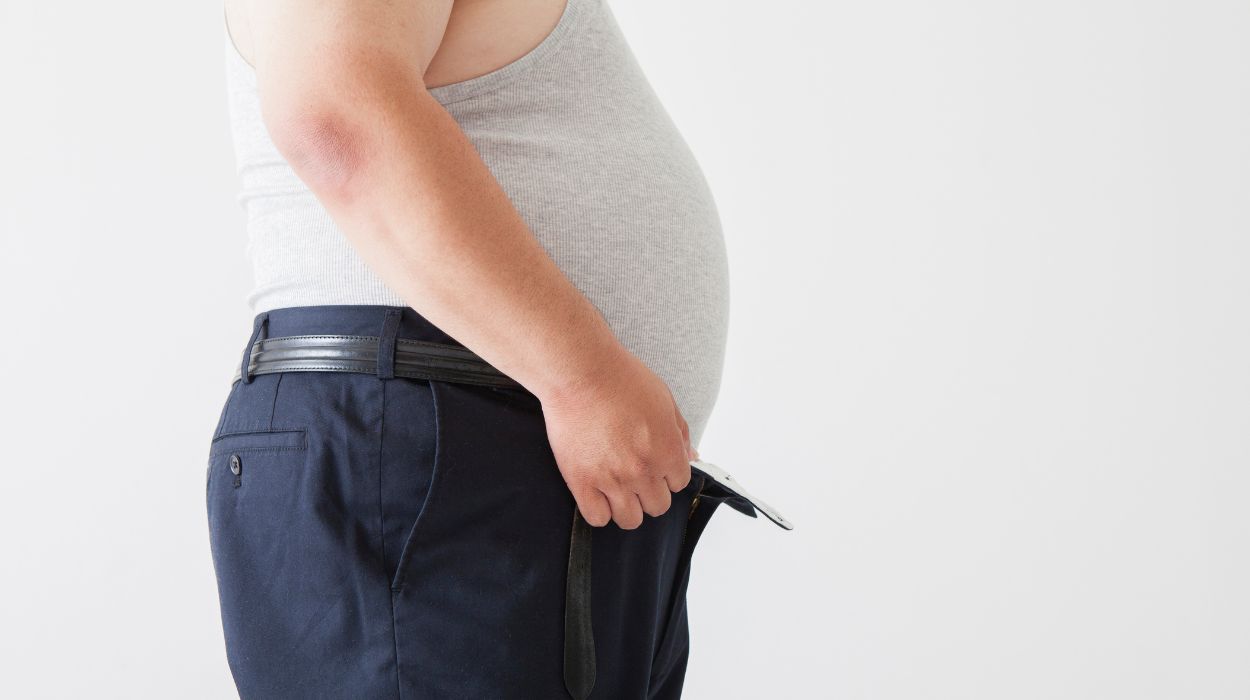How To Lose Lower Belly Fat In Males In 2024? 8 Best Methods For Men To Follow

Maintaining a flat belly makes you look great. That’s why belly fat causes a lot of concern to many men who resolve to research on how to lose lower belly fat in males.
However, according to scientific evidence, appearance is not the only issue you have to deal with when you have lower belly fat. Belly fat is composed of visceral fat[1] instead of subcutaneous fat. The drawback is that visceral fat is found deep within your body and is linked to various chronic conditions such as diabetes, heart disease, hypertension, and cancer.
This article explores the causes of lower belly fat and provides 8 practical tips to reduce belly fat in men. It also explores the health risks caused by lower belly fat in men. Continue reading to learn more.
8 Tips To Lose Lower Belly Fat For Men
What is the best approach to reduce lower belly fat? Here are 8 effective strategies that will help decrease lower belly fat in men:
- Stay physically active by exercising regularly.
- Eat a balanced diet.
- Maintain a calorie deficit..
- Rest and always get adequate sleep.
- Consume more soluble fiber.
- Add intermittent fasting to your dieting routine.
- Reduce the amount of alcohol you drink per day.
- Manage your stress properly.
8 Best Ways For Men To Lose Lower Belly

Losing lower belly fat is a common fitness goal for most men. Here are 8 effective ways to counter this problem in men.
Featured Partner Offer

PhenQ
- Helps to burn fat
- Crushes food cravings
- Boosts energy and balances mood
- High-quality formula
Money Back Guarantee and Free US Shipping
Exercise
Targeting specific fat from any part of the body is impossible. No type or amount of one exercise, such as sit-ups, will reduce belly fat. However, a structured and routine exercise plan incorporating aerobic exercise and resistance training can help decrease belly fat.
According to fitness experts, high-intensity interval training, or HIIT,[2] is particularly effective for burning abdominal visceral fats. In this type of training, individuals perform short interval exercises at a high intensity followed by a moderate intensity or slow rest periods.
In a different study, researchers found that resistance and strength training exercises like weight lifts[3] can help lose belly fat. Although mainly associated with muscle building and retention, resistance training exercises like weight lifting can help reduce body fat percentage in healthy male adults.
Adding these types of exercise into your daily routine may improve body composition and make you leaner.
Healthy Diet
Consuming the recommended amounts of nutrients is essential for a healthy life. If you are struggling with belly fat, select a healthy eating plan and stick to it.
You can achieve this by:
- Replacing trans fats with moderate amounts of monounsaturated and polyunsaturated fats from healthy foods such as avocados, coconut oil, olive oil, fish oil, and more.
- Eating good lean protein sources such as eggs, legumes, chicken, fish, lean beef, low-fat dairy products, and more.
- Creating a caloric deficit in which you expend more calories than you consume.
- A low-carb approach that involves eating plant-based foods and fewer refined carbs. You can try whole food sources such as rice, quinoa, potatoes, fruits and veggies, and more.
- Getting rid of sugary and highly processed foods and beverages.
- Sometimes, detox or probiotics supplements come in handy.
Create A Caloric Deficit Eat Low-Calorie Foods
When you eat and drink fewer calories than your body can burn you end up creating a caloric deficit. When the body is in a caloric deficit, it can help burn visceral and subcutaneous fats in the stomach.
To lose weight, you must create a caloric deficit. Men and women have different caloric requirements.[4] On average, a man should consume about 2,000 calories a day to lose one pound per week. For the average woman, one should limit oneself to approximately 1,500 or less calories to lose one pound per week. This can be achieved by reducing the amount of calories you consume.
However, factors such as overall health, weight, and activity level must be considered. Experts recommend reducing your intake of high-calorie foods such as processed and sugary treats. Instead, opt for low-calorie but nutritious options in fruits, vegetables, and whole grains, among many more.
Getting Adequate Sleep
According to the Centers for Disease Control,[5] about a third of American adults do not get enough sleep. If you are not getting the right amount of shut-eye, it could be a reason for a persistent lower belly.
Getting enough sleep ensures your body gets adequate rest to heal and recover. Interestingly, the amount of sleep you get can also affect your weight.
Since sleep is essential for all bodily functions, experts recommend sleeping 7-9 hours every night. Sleeping for fewer hours means slowed metabolism to preserve energy, which causes the body to store excess fats.
Eat More Soluble Fiber
Getting enough fiber can help lower abdominal fat in men.
There are two types of fiber, namely, soluble and insoluble fiber. Soluble fiber can absorb water, whereas insoluble fiber doesn’t combine with water to bulk the stool for easy digestion. In this manner, it also helps to relieve constipation.
Unlike other carbs, fiber takes a long time to be digested and creates a sense of fullness that leads to less cravings. Through this, fiber helps to regulate your calorie intake, which can be beneficial in how to get rid of lower belly fat males.
Fiber-rich foods include fruits, vegetables, legumes, and whole grains.
Consider Intermittent Fasting
Intermittent fasting involves eating and fasting for some time rather than monitoring the specific type of foods you eat. The question remains: is intermittent fasting effective in reducing lower belly fat in men?
Scientific evidence suggests intermittent fasting[6] can promote improved body health in several ways. During fasting, the body taps into fat reserves to fuel the body. This can lead to weight loss, and, most importantly, it can help you to get rid of the excess lower belly fat that has been causing you frustration.
Besides fat loss, some studies link intermittent fasting with other benefits, including reduced risk of obesity,[7] reduced inflammation, improved blood sugar control, and even longevity. All these work effectively to help you shed pounds and target lower belly fat.
Regulating Alcohol Intake
Can alcohol make you gain lower belly fat?
Although beer alone is not to blame, sometimes, too much alcohol can contribute to developing a beer belly. The significant association between alcohol and belly fat or a bigger waist circumference boils down to the lifestyle choices made by people who consume too much alcohol.
With an overabundance of alcohol, your liver starts burning off calories from alcohol instead of fats. As alcohol becomes your primary energy provider, fat can quickly accumulate in the midsection.
Additionally, alcohol is known to increase appetite.
Usually, when you feel hungry, you are likely to make health considerations before deciding on a particular food item. On the contrary, alcohol disrupts how brain impulses work and, in a way, encourages overeating.
This means you’ve lost your calorie count and are still waiting for more. Suddenly, you are looking at excess belly fat.
If you must drink alcohol, make sure to drink in moderation. The CDC recommends that men drink up to two drinks a day.[8] This reduces the probability of fat building up in the belly over time.
Stress Management
Cortisol is your body’s stress hormone.
When you are stressed, the two adrenal glands release cortisol into the bloodstream. Unfortunately, prolonged stress can lead to high cortisol levels, which can result in unwelcome belly fat.
Excess cortisol leads to uncontrolled eating.
When you are constantly stressed, your brain’s ability to control your appetite is diminished, leaving you in a perpetual state of hunger. Instead of choosing healthy foods, you’ll choose whatever the body craves, including sugary and processed foods. This can affect your overall health and contribute to lower belly fat.
Unfortunately, there is no single solution to cure stress. However, individuals can manage or reduce stress by adjusting their lifestyles. For example, you can unwind at home, exercise, watch a movie, listen to music, or socialize with friends.
Causes Of Lower Belly Fat In Men
So far, you’ve familiarized yourself with tips to reduce excess lower belly fat. The following section provides some common reasons why some men might be more prone than others to develop belly fat.
Major causes include:
- Old age. As an individual grows older, their muscle mass decreases, and so does their metabolism. A slowed metabolism means your body cannot burn as many calories as it would in your younger days, leading to acquired weight. Unfortunately, some of this weight tends to collect around the lower belly.
- Overeating. Eating more calories than you burn daily means more pounds everywhere, including in the belly. Experts recommend burning at least 500 calories[9] a day to lose a pound. Although this may seem too much, the best place to start is through your diet. If you reduce your calorie intake by 500 calories daily, you can comfortably shed one pound a week.
- Genetics. Sometimes, abdominal visceral fat accumulation might be because you are genetically predisposed to gain it. Genes[10] control your appetite, how your body burns calories, and even how weight is distributed in your thighs, hips, butt, and belly. If you are from a family line where family members struggle with weight, this may be the cause of the excess belly fat.
- Activity level. Most American men live sedentary lives and don’t move around much.
- Not ready for lifestyle adjustments. Some men believe they might gain fat if they stop smoking.
Featured Partner Offer

Health Risks Men May Suffer From Lower Belly Fat

Lower belly fat is a severe problem for your health, and getting rid of it isn’t easy. The problem with belly fat is that it is not limited to subcutaneous fat, which is the padding just beneath the skin. It also includes visceral fat. Although you can’t see or feel it, this fat lies deep inside the abdomen and wraps internal organs, including the heart, liver, lungs, and intestines.
Unlike fats in other parts of the body, lower belly fat increases your risk for chronic diseases such as high blood pressure, cardiovascular disease, diabetes, and colorectal cancer.
Regardless of a person’s overall weight, excess lower belly fat increases the risk of several conditions[11] in men.
These include:
- Heart disease and related complications.
- Stroke.
- High blood pressure.
- Fatty liver.
- Certain cancers, such as colon cancer.
- Asthma.
- Sleep apnea.
- Type 2 diabetes.
- Dementia.
- Early death.
The Takeaways
Everyone has some fat in their belly, but it may be harmful if it accumulates in the lower belly as visceral fat. Losing this kind of fat requires a caloric deficit and lifestyle changes including diet and exercise.
You can achieve this by eating low-calorie foods and consistently engaging in workouts. However, shedding lower belly fat takes more than just working in the gym.
For best results, it is recommended that you stick to a healthy weight loss diet, learn how to manage stress, get adequate sleep, and adjust your lifestyle to align with your fitness goals. This way, you can shrink your overall weight, which, in turn, helps to reduce the dangerous layer of visceral fat.
Frequently Asked Questions
There are many reasons why men might develop lower belly fat, including age, genetics, lack of exercise, poor diet, inadequate rest, stress, and poor lifestyle choices.
To lose lower belly fat fast, it is recommended that you stay physically active, eat well, and get adequate rest.
In addition to a healthy diet, an exercise routine that incorporates both aerobic and strength training can help reduce belly fat in men.
It is typically impossible to spot weight from your lower belly. The only way you can lose lower belly fat is by losing overall body fat. You can achieve this goal by exercising regularly, staying hydrated, eating a balanced diet, and getting adequate rest.
Full-body strength training exercises such as HIIT twice a week can help reduce belly pooch in men.
Yes. Belly fat is a visceral fat that is always harder to burn than subcutaneous fat.
HIIT is the best workout strategy for losing weight and lowering belly fat in men.
Too much alcohol consumption can contribute to excess fat deposition in the midsection.
Resources
- Nauli, A.M. and Matin, S. (2019). Why Do Men Accumulate Abdominal Visceral Fat? Frontiers in Physiology, [online] 10. doi:https://doi.org/10.3389/fphys.2019.01486.
- Maillard, F., Pereira, B. and Boisseau, N. (2017). Effect of High-Intensity Interval Training on Total, Abdominal and Visceral Fat Mass: A Meta-Analysis. Sports Medicine, [online] 48(2), pp.269–288. doi:https://doi.org/10.1007/s40279-017-0807-y.
- CDC (2023). Physical Activity for a Healthy Weight . [online] Centers for Disease Control and Prevention. Available at: https://www.cdc.gov/healthyweight/physical_activity/index.html.
- Osilla, E.V., Safadi, A.O. and Sharma, S. (2022). Calories. [online] Nih.gov. Available at: https://www.ncbi.nlm.nih.gov/books/NBK499909/.
- Watson, N.F., M. Safwan Badr, Belenky, G., Bliwise, D.L., Buxton, O.M., Buysse, D.J., Dinges, D.F., Gangwisch, J.E., Grandner, M., Kushida, C.A., Malhotra, R.K., Martin, J.L., Patel, S.R., Quan, S.F., Esra Tasali, Twery, M.J., Croft, J.B., Maher, E., Barrett, J.A. and Thomas, S.M. (2015). Recommended Amount of Sleep for a Healthy Adult: A Joint Consensus Statement of the American Academy of Sleep Medicine and Sleep Research Society. Sleep. [online] doi:https://doi.org/10.5665/sleep.4716.
- Liu, S., Zeng, M., Wan, W., Huang, M., Li, X., Xie, Z., Wang, S. and Cai, Y. (2023). The Health-Promoting Effects and the Mechanism of Intermittent Fasting. Journal of diabetes research, [online] 2023, pp.1–15. doi:https://doi.org/10.1155/2023/4038546.
- Welton, S., Minty, R., O’Driscoll, T., Willms, H., Poirier, D., Madden, S. and Kelly, L. (2020). Intermittent fasting and weight loss: Systematic review. Canadian family physician Medecin de famille canadien, [online] 66(2), pp.117–125. Available at: https://www.ncbi.nlm.nih.gov/pmc/articles/PMC7021351/.
- Anon, (2023). Alcohol Questions and Answers. [online] Available at: https://www.cdc.gov/alcohol/faqs.htm#:~:text=To%20reduce%20the%20risk%20of,days%20when%20alcohol%20is%20consumed.
- Ju Young Kim (2021). Optimal Diet Strategies for Weight Loss and Weight Loss Maintenance. Journal of obesity & metabolic syndrome, [online] 30(1), pp.20–31. doi:https://doi.org/10.7570/jomes20065.
- Sun, C., Kovacs, P. and Guiu‐Jurado, E. (2021). Genetics of Body Fat Distribution: Comparative Analyses in Populations with European, Asian and African Ancestries. Genes, [online] 12(6), pp.841–841. doi:https://doi.org/10.3390/genes12060841.
- Darsini Darsini, Hamidah Hamidah, Hari Basuki Notobroto and Eko Agus Cahyono (2020). Health Risks Associated with High Waist Circumference: A Systematic Review. Journal of Public Health Research, [online] 9(2), pp.jphr.2020.1811–jphr.2020.1811. doi:https://doi.org/10.4081/jphr.2020.1811.
More from Weight Management
-

How To Drink Apple Cider Vinegar For Weight Loss In 1 Week In 2024
January 10, 2024
Taking apple cider vinegar has become a sensation for its supposed health benefits, despite its sour taste. Apple cider vinegar may…Read more -

How To Lose Belly Fat After 50: Here’s 10 Tips For People Over 50 To Try In 2024
December 27, 2023
Losing weight over 50 can feel challenging, especially in stubborn areas like the abdomen. As we age, hormonal changes, slower metabolism,…Read more -

How To Lose Weight With Hypothyroidism – 10 Ways You Should Try In 2024
December 22, 2023
Hypothyroidism[1] is a condition that occurs when a person has low levels of thyroid hormone, and it most often develops when…Read more -

Hypnosis For Weight Loss: Unlocking Your Mind’s Potential For Success 2024
December 20, 2023
You’ve heard about various methods and tools to achieve weight loss and you might have looked into how to get ozempic.…Read more

